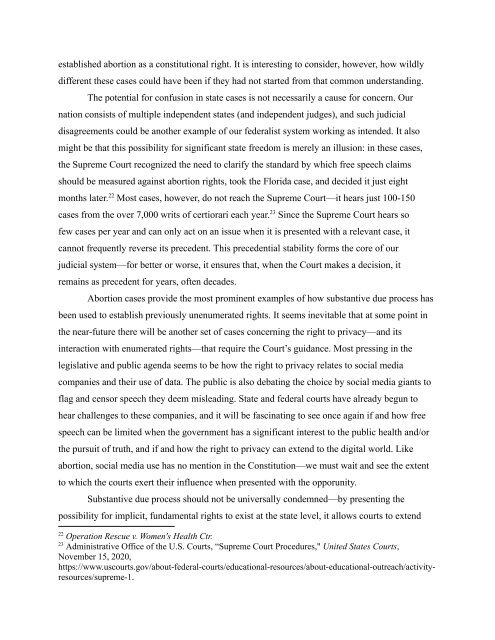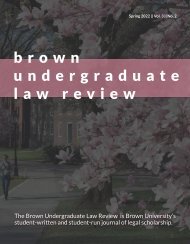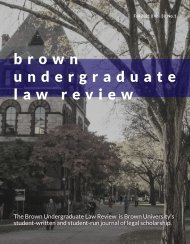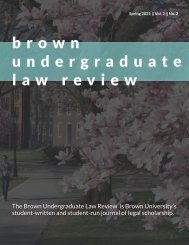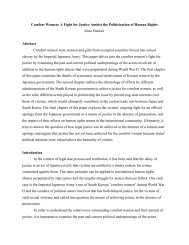Substantive Due Process: Dangerous or Necessary?
Carolyn Zech '24
Carolyn Zech '24
Create successful ePaper yourself
Turn your PDF publications into a flip-book with our unique Google optimized e-Paper software.
established ab<strong>or</strong>tion as a constitutional right. It is interesting to consider, however, how wildly<br />
different these cases could have been if they had not started from that common understanding.<br />
The potential f<strong>or</strong> confusion in state cases is not necessarily a cause f<strong>or</strong> concern. Our<br />
nation consists of multiple independent states (and independent judges), and such judicial<br />
disagreements could be another example of our federalist system w<strong>or</strong>king as intended. It also<br />
might be that this possibility f<strong>or</strong> significant state freedom is merely an illusion: in these cases,<br />
the Supreme Court recognized the need to clarify the standard by which free speech claims<br />
should be measured against ab<strong>or</strong>tion rights, took the Fl<strong>or</strong>ida case, and decided it just eight<br />
months later. 22 Most cases, however, do not reach the Supreme Court—it hears just 100-150<br />
cases from the over 7,000 writs of certi<strong>or</strong>ari each year. 23 Since the Supreme Court hears so<br />
few cases per year and can only act on an issue when it is presented with a relevant case, it<br />
cannot frequently reverse its precedent. This precedential stability f<strong>or</strong>ms the c<strong>or</strong>e of our<br />
judicial system—f<strong>or</strong> better <strong>or</strong> w<strong>or</strong>se, it ensures that, when the Court makes a decision, it<br />
remains as precedent f<strong>or</strong> years, often decades.<br />
Ab<strong>or</strong>tion cases provide the most prominent examples of how substantive due process has<br />
been used to establish previously unenumerated rights. It seems inevitable that at some point in<br />
the near-future there will be another set of cases concerning the right to privacy—and its<br />
interaction with enumerated rights—that require the Court’s guidance. Most pressing in the<br />
legislative and public agenda seems to be how the right to privacy relates to social media<br />
companies and their use of data. The public is also debating the choice by social media giants to<br />
flag and cens<strong>or</strong> speech they deem misleading. State and federal courts have already begun to<br />
hear challenges to these companies, and it will be fascinating to see once again if and how free<br />
speech can be limited when the government has a significant interest to the public health and/<strong>or</strong><br />
the pursuit of truth, and if and how the right to privacy can extend to the digital w<strong>or</strong>ld. Like<br />
ab<strong>or</strong>tion, social media use has no mention in the Constitution—we must wait and see the extent<br />
to which the courts exert their influence when presented with the opp<strong>or</strong>unity.<br />
<strong>Substantive</strong> due process should not be universally condemned—by presenting the<br />
possibility f<strong>or</strong> implicit, fundamental rights to exist at the state level, it allows courts to extend<br />
22<br />
Operation Rescue v. Women's Health Ctr.<br />
23<br />
Administrative Office of the U.S. Courts, “Supreme Court Procedures," United States Courts,<br />
November 15, 2020,<br />
https://www.uscourts.gov/about-federal-courts/educational-resources/about-educational-outreach/activityresources/supreme-1.


